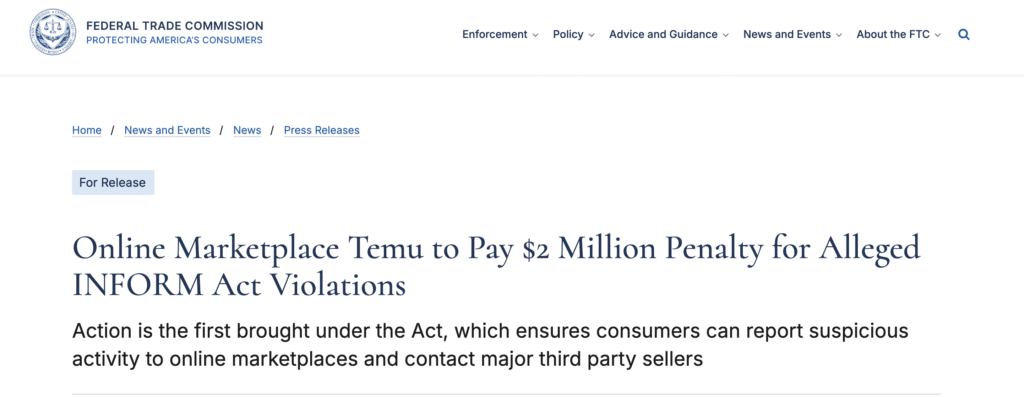In the fast-paced world of e-commerce, where consumers hunt for deals on platforms promising global goods at rock-bottom prices, the balance between convenience and accountability is precarious. The Federal Trade Commission’s (FTC) recent $2 million settlement with Temu, the Chinese-owned online marketplace, marks the agency’s first enforcement action under the INFORM Consumers Act of 2023. Finalized earlier this month, this case is a pivotal moment for digital marketplaces, signaling that the FTC is intensifying its oversight of compliance and consumer protections. Far from a mere penalty, this settlement sets a new standard for transparency, fraud prevention, and data privacy in an industry where trust is as valuable as the goods sold.
If you’re looking for INFORM Act compliance or Data Privacy software solutions then book a demo to see how our privacy and compliance superheroes can help you.

The INFORM Act: A Framework for Accountability
The Integrity, Notification, and Fairness in Online Retail Marketplaces for Consumers Act (INFORM Act), effective since June 2024, targets the chaos of third-party selling that has fueled counterfeit goods, unsafe products, and fraud across platforms like Temu, Amazon, and Shein who just paid a CNIL privacy fine over cookies. The law requires online marketplaces to verify and disclose key details about “high-volume” third-party sellers—those generating $5,000 or more annually. This includes business names, addresses, bank accounts, tax IDs, and contact information, all displayed prominently on product listings. Additionally, platforms must provide accessible tools—email, phone, or in-app mechanisms—for consumers to report suspicious activity, empowering them to flag fraudulent or unsafe offerings.
Temu’s violations, as outlined in the FTC’s complaint, centered on inadequate compliance with these mandates. From June 2024 to at least November, Temu allegedly failed to provide clear seller disclosures on its mobile site and “gamified” product listings—those interactive, game-like features that entice users with flash deals. Reporting mechanisms were either missing or insufficient, with no dedicated phone line for consumers to flag issues on these gamified pages. This left shoppers vulnerable to the very risks the INFORM Act seeks to eliminate: counterfeit goods, unsafe products, and fraudulent sellers operating under the radar.
The Settlement: More Than a Fine
The $2 million civil penalty, payable by Temu’s parent company, Whaleco Inc., within seven days, is just the start. The settlement, pending court approval, imposes stringent injunctive measures: Temu must implement a telephonic reporting hotline with user-friendly features like listen-back options, ensure seller disclosures are conspicuous across all platforms (including gamified listings), and submit to ongoing compliance audits. These requirements aren’t just fixes; they’re a roadmap for platforms to prioritize consumer safety over unchecked growth. For Temu, a platform with millions of users drawn to its ultra-low prices, this is a mandate to rebuild trust through transparency.
Implications for E-Commerce Compliance
For online marketplaces, the Temu settlement is a clarion call: compliance with the INFORM Act is non-negotiable. Verifying seller identities means collecting sensitive data, which platforms must safeguard to avoid privacy violations. The FTC’s focus on accessibility—ensuring disclosures and reporting tools are front and center, even in gamified features—raises the bar for user experience. Smaller platforms may struggle to retrofit systems, while giants like Amazon, already facing similar scrutiny, will likely invest heavily in audits and tech solutions like AI-driven fraud detection. With third-party sellers driving 30% of U.S. e-commerce sales, the cost of non-compliance—fines, lawsuits, and eroded trust—could cripple laggards.
FTC’s Broader Crackdown on Privacy and Compliance
The Temu case doesn’t stand alone; it’s part of a broader FTC offensive to enforce privacy and compliance in the digital age. Under Chair Lina Khan, the agency is wielding its authority with unprecedented vigor, targeting not just marketplace fraud but also data privacy lapses across sectors.
Recent Privacy Enforcement Actions
In August 2025, the FTC settled with a children’s robot toy manufacturer for illegally collecting personal data from kids without parental consent, violating the Children’s Online Privacy Protection Act (COPPA). The company faced a $1.5 million fine and was ordered to delete improperly collected data. This action reflects the FTC’s zero-tolerance stance on exploiting vulnerable users, particularly children, in digital spaces.
Similarly, Disney recently paid a $10 million penalty for enabling third-party apps to harvest children’s data without proper parental notifications, another COPPA violation. The settlement underscores the FTC’s focus on holding even the biggest players accountable when they fail to protect sensitive user information, especially in app ecosystems that mirror the third-party dynamics of e-commerce marketplaces.
Data Security and Cross-Border Concerns
The FTC’s August 2025 warning to companies about sharing consumer data with foreign entities—particularly those under authoritarian regimes—signals a new frontier in enforcement. For platforms like Temu, with ties to China, this adds pressure to secure data against misuse. The INFORM Act’s requirement to collect seller PII amplifies this risk; mishandling that data could trigger not just INFORM violations but also Section 5 claims under the FTC Act for unfair or deceptive practices. With data breaches costing businesses an average of $4.88 million in 2024, the stakes for robust cybersecurity are sky-high.
A New Era for Digital Trust
Temu’s $2 million settlement is a watershed moment, crystallizing the FTC’s resolve to tame the e-commerce frontier. For platforms, the message is clear: invest in compliance or face escalating consequences. By embedding seller verification, transparent disclosures, and accessible reporting into their core operations, marketplaces can turn regulatory mandates into competitive advantages. Consumers, armed with better tools to spot scams, stand to benefit most. As the FTC’s enforcement wave—spanning the INFORM Act, COPPA, and data security—gains momentum, companies that treat compliance as a strategic asset will thrive, while those cutting corners risk becoming cautionary tales. In 2025, with AI-powered shopping and global supply chains reshaping commerce, the future belongs to platforms that prioritize trust as fiercely as they chase profits.